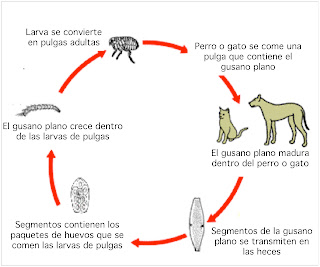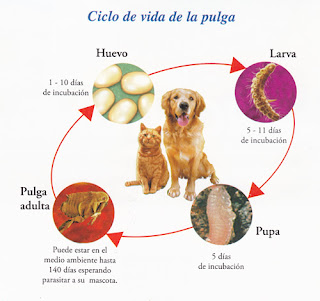Las pulgas son los peores amigos que una mascota puede tener a lo largo de su vida. Unos amigos pesados, desagradables y bastante "gorrones" que se alojan en el cuerpo de nuestras mascotas para chuparles la sangre y, de paso tienen la "gentileza" de transmitirle enfermedades demasiado molestas con síntomas - picores, dolores o irritaciones - no me menos desagradables.
Un enemigo muy fuerte, a pesar de su pequeño tamaño, pero NO imposible de vencer. Para prevenirlas es importante estar alerta ¿Cómo? Protegiendo a la mascota y su entorno. Lo primero y más importante, es llevar a cabo la prevención mediante tratamientos específicos; tendréis que estar al tanto de las últimas novedades en este terreno y conocer bien los diferentes productos que se encuentran en el mercado, para saber cuál será el que más convenga a vuestra mascota. Siempre, procurar asesoraros por vuestros veterinarios y no toméis decisiones por vuestra cuenta, a cada mascota le funciona un tratamiento u otro.
A veces, aunque hayáis tomado todo tipo de medidas las pulgas encuentran el "camino" para acoplarse de mala manera en el cuerpo del animal, por lo tanto, es conveniente que sepáis qué enfermedades le pueden transmitir a vuestro perro.
- Dermatitis Alérgica aparece gracias a la picadura de pulga. Provoca picores, irritación y dolores. ¿Cómo reconocerla? El perro puede manifestar diferentes síntomas: la piel se oscurece, se hincha y pierde elasticidad. Picores por todo el cuerpo y perdida de pelo en su tercio posterior.
- Gusano Plano es otro de los problemas que las pulgas pueden transmitir a nuestras mascotas. A veces, los perros se rascan la boca y pueden ingerir, sin querer, pulgas infestadas con el quiste de gusano plano. Éste se libera en el intestino de nuestro perro y después se desarrolla como gusano. Los daños que puede provocar al animal son varios: perdidas nutricionales, diarreas, malestar general y, en caso muy graves, anemia.
En cualquiera de ambos casos existe tratamiento, pero, es importante que a la mínima duda acudáis a vuestro veterinario para poner remedio lo antes posible y que vuestro perro no sufra.
Recordar que las pulgas, debido a su tamaño, no son fáciles de ver y, para más inri, se reproducen a gran velocidad. Estar alerta e intentar, en la medida de lo posible, prevenirlas protegiendo al animal con las indicaciones de vuestros veterinarios.
Fleas are the worst friends that a pet can have over your life. Some friends heavy, unpleasant and quite "freeloaders" who stay at our pet's body to suck blood and in the process have the "courtesy" to transmit diseases too annoying symptoms - itching, pain or irritation - not less unpleasant .
An enemy very strong, despite its small size, but NOT impossible to beat. To prevent is important to watch what? Protecting your pet and its environment. First and most important, is to carry out prevention through specific treatments will have to be aware of the latest developments in this field and know well the different products on the market, to know what will be the most advantageous to your pet. Always, seek veterinary advice you for your Take no decisions on your own, every pet will work one treatment or another.
Sometimes, even though you have taken all measures fleas are the "way" to engage in a bad way in the animal's body, therefore, it is advisable that you know what diseases you can produce your dog.
- Allergic Dermatitis appears through a flea. It causes itching, irritation and pain. How to recognize it? The dog may manifest different symptoms: skin darkens and swells and loses elasticity. Itching all over the body and hair loss in its posterior third.
- Plano Worm is another problem that fleas can transmit to our pets. Sometimes dogs scratch their mouth and can ingest unwittingly flea infested with tapeworm cyst. It is released in the intestine of our dog and then develops as worm. The damage can cause the animal are several: nutritional losses, diarrhea, malaise and, if very severe anemia.
In either case there is treatment but it is important that at the slightest doubt you call on your vet to remedy as soon as possible that your dog does not suffer.
Remember that fleas, because of their size, they are easy to see and, to make matters worse, they reproduce rapidly. Be alert and try as far as possible, prevent animal protecting your veterinary indications.





No hay comentarios:
Publicar un comentario